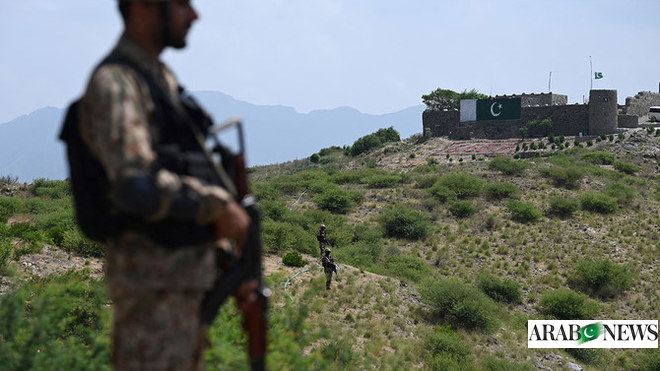KABUL: The Taliban on Wednesday denied Afghan involvement in recent deadly attacks on Chinese workers in neighboring Pakistan.
Five Chinese nationals employed at a hydropower project in Das in northwestern Khyber Pakhtunkhwa province, which borders Afghanistan, were killed along with the driver in a suicide bombing on March 26.
Pakistan’s military said Tuesday that the attack was planned in Afghanistan and that the attackers were Afghan nationals.
Pakistan military spokesperson Maj. Gen. Ahmad Sharif also told reporters that Islamabad has “credible evidence” that militants are using Afghan soil to launch attacks on Pakistan, and that such attacks have been reported since the beginning of the year. It said more than 60 security personnel had been killed in the violence. And authorities in Kabul were said to have been powerless to deal with the violence.
The Taliban’s defense ministry on Wednesday refuted that claim, calling it “irresponsible and far from reality.”
“Blaming Afghanistan for such incidents is a failed attempt to divert attention from the truth, and we strongly reject it,” ministry spokesperson Enayatullah Khowarazmi said in a statement.
“The killing of Chinese nationals in the Khyber Pakhtunkhwa region, which is under tight security by the Pakistani army, shows the weakness of Pakistan’s security institutions or their cooperation with the attackers.”
The Das attack followed two other major attacks in the region, where China is investing more than $65 billion in infrastructure projects as part of its broader Belt and Road Initiative.
On March 25, a naval air base was attacked in Turbat, Pakistan’s Balochistan province, and on March 20, insurgents attacked a government facility in the nearby Gwadar district, which has a Chinese-run port.
Twin rebellions are occurring in Pakistan. One is by armed groups associated with Pakistan’s Tehreek-e-Taliban group, and the other is a separatist movement in Balochistan, Pakistan’s poorest southwestern province despite being rich in natural resources. This is due to the ethnic separatists who seek it.
The attack in Balochistan was claimed by the Baloch Liberation Army, the most prominent of several separatist groups in the province, but no group claimed responsibility for the attack in Das.
But Nasser Ahmad Nawidi, a professor of international relations at Kabul’s Salam University, said blaming Afghanistan for it was “baseless”.
“The insurgency in this region has existed for a very long time and is not attributed to any particular region or country. Pakistan views the Islamic Emirate in its current form as a threat to its interests. Government of Pakistan “We need to develop our relations with the Islamic Emirate on the basis of equal rights and goodwill for the sake of stability in the entire region,” Nawidi told Arab News.
“Regional stability requires mutual cooperation and trust. The governments of Afghanistan and Pakistan must end the crisis in their relations as soon as possible. may cause it.”
Abdul Saboor Mubaris, a political scientist and lecturer at Jalalabad’s Alfalah University, said Pakistan’s claims were aimed at pressuring the Taliban to support Islamabad in operations against the TTP.
“The Pakistani government uses various forms of pressure, including forcibly returning Afghan refugees, claiming security threats from Afghanistan, closing borders, and challenging Afghan traders,” he said, adding that the It added that accusations and allegations regarding the links between the two countries are impacting the situation in Pakistan. The Taliban regime still sought recognition from foreign governments.
“This claim is critical for the Islamic Emirate as it seeks engagement with countries in the region and around the world while the government remains unrecognized by countries around the world.”

